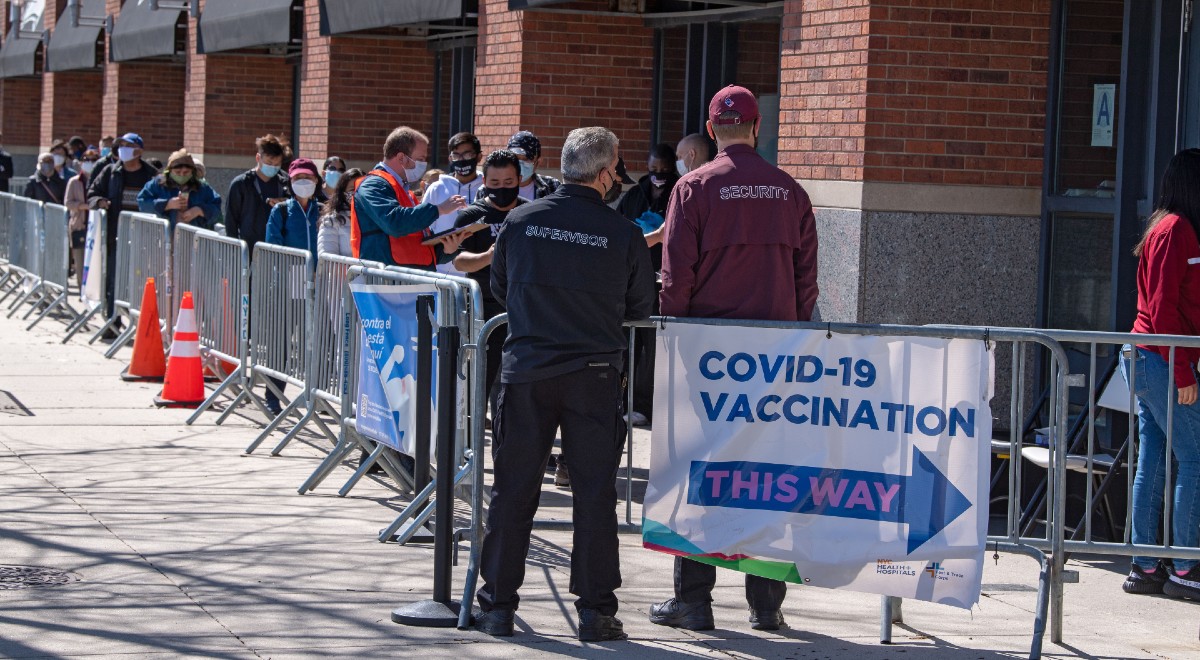More and more EU countries are offering booster doses of COVID-19 to their most vulnerable people, including France, Germany, Spain, Greece, Denmark and Hungary. The fourth dose has been announced in Israel.
Given that vaccine efficacy and antibody levels are declining over time, it appears that re-injection will be required every few months – every year or every 5-6 months, said Israeli pandemic coordinator Salman Zarqa, calling for stockpiling.
In turn, a serological study conducted at an Israeli hospital near Tel Aviv showed that the level of antibodies after the third dose of COVID-19 vaccine is 10 times higher than after the second dose. This means that the effect of the third dose may last longer than previously expected.
32 percent of Israelis have already taken the third dose of Pfizer-BioNTech, which is prescribed to all people over 12 years of age.
Booster dose
In turn, since the beginning of August, more than half a million people, or 5.5 percent of the population, have been vaccinated with the third dose in Hungary. Dates of its reception can be booked from August 1. According to the authorities, the booster dose is especially recommended for the elderly, the chronically ill and people with weakened immune systems, but anyone aged 18 and older can be vaccinated. People who have previously received the drug from the Chinese company Sinopharm are ready to take the third dose.
In France, from September 1, booster vaccination is carried out in people over 80 years, patients with weakened immune systems and, among others, cancer patients or people on dialysis. From September 11, the campaign is aimed at people living in nursing homes, and in the coming weeks will be extended to all people over 65 and people with comorbidities.
Also in Denmark, in September, the third dose of the vaccine was introduced to people in homes for the elderly and selected groups with weakened immune systems.
Most German states began offering revaccination to vulnerable groups in September, and about 10 million revaccinations are expected by the end of the year, 3.14 million of which this month. The third dose, or, in the case of Johnson & Johnson, the second dose is for people whose vaccination age is at least six months. The focus is on the elderly who need care and people with weakened immune systems. Vaccination – only with vaccines from Pfizer-BioNTech or Moderna – can also be considered recovered, as well as people who have received drugs only from AstraZeneca or Johnson & Johnson.
In Spain, the introduction of the third dose on September 9 affected about 100,000 people. Patients with immunosuppression, ie inhibition of the production of antibodies and immune cells. Most of them are transplant recipients. In the near future, the campaign may be extended to people over 65 years of age. Some medical and scientific communities claim that most elderly people who have not had a coronavirus infection have very low antibody levels three months after the end of vaccination.
In Portugal, the third dose began on September 13. As in Spain, it began to be administered to people with immunosuppression. Although the government announced on September 6 that it did not intend to administer the third dose to the adult population as a whole, it said it would consider administering it to certain groups (such as cancer, HIV, and transplant patients).
Revaccination began in Cyprus on September 3. Currently vaccinated people over 65 years of age, doctors, residents and staff of nursing homes, as well as people undergoing immunosuppressive treatment and have immunodeficiency. The third dose vaccination program covers those who received the second dose at least six months ago and were vaccinated with drugs from Pfizer-BioNTech, Moderna and AstraZeneca.
More countries
Greek citizens can receive the third dose from September 14. Currently, these are people over 60 who are in nursing homes and people with weakened immune systems.
From September 20, you can sign up for booster vaccination in the Czech Republic. Condition 8 months after the second dose. The third dose is recommended for people over 60, and priority will be given to high-risk groups and some occupational groups.
In Slovakia, a decree was issued on 13 September to introduce third-dose vaccination, but there are no regulations and it is unknown when these vaccinations will begin. The first additional dose should be given to healthcare professionals, followed by immunocompromised patients, residents and social workers, school staff and people over 60 years of age.
In Finland, the third dose of the vaccine is first given to people at risk and with a weakened immune system, and this is likely to happen in the coming weeks.
The Swedish Health Authority announced in the summer that a third dose of COVID-19 would be needed, but did not specify when. According to the country’s chief epidemiologist Anders Tegnell, a specific decision will be made after analyzing the results of the study: how long vaccinated people lose antibodies. At present, it has been decided to offer the third dose only to immunocompromised patients, critically ill patients in need of dialysis.
The third dose will start next week in the UK. It will be offered to approximately 30 million people – over the age of 50, people under this age who have conditions that increase their risk, as well as medical and social workers who are in direct contact with patients and residents.
The Irish authorities have also announced a third dose for prisoners in care facilities over the age of 65 and all people aged 80 and over. To be eligible for additional vaccination, at least six months must have elapsed since the previous vaccination.
When some countries began to introduce booster doses, the World Health Organization (WHO) called for a postponement of the third dose for fear that vaccine supplies would run out when millions of people in poorer countries had not yet been vaccinated with the first dose.

